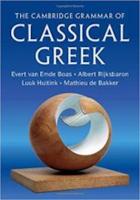
CUP (2019) p/b 811pp £29.99 (ISBN 9780521127295)
Why a new Greek Grammar on this formidable scale? In their (helpful) Preface, the editors considered that existing materials ‘did not reflect decades’ worth of advances in the linguistic description of Ancient Greek’; Weir Smyth’s Greek Grammar (1956) appeared before such advances had been possible, and was, in any case, ‘often perceived by undergraduates as daunting and dense’. The target audience is seen as ‘university students at all levels and teachers’. Homeric grammar is excluded, but there is a chapter on Ionic prose and some dialectal features of drama, notably the ‘Doric’ alpha.
Your reviewer has looked at this grammar mainly from the point of view of a regular user, brought up, so to speak, on the grammars of Goodwin and Smyth. Here, I can look at only a tiny number of features of what is, by any standard, a most thoroughgoing offering, in which there is no sense of the ‘denseness’ apparently felt by some students with Smyth: indeed, ‘spaciousness’ would be a fitting word. The editors were understandably seeking to produce an uncluttered text, which entails, for example, a minimum of notes (thus Wackernagel’s Law is introduced—see below—without reference to its appearance in 1892 in Indogermanische Forschungen).
The Contents—25 pages—are divided into three parts: Phonology and Morphology (sections 1-25); Syntax (26-57); and Textual Coherence (58-61). Take the verbs: the authors take 160 pages to cover the basic elements of this vitally important area, using παιδεύειν as the introductory verb, by taking the subject item by item: Basic Categories and Elements; Thematic and Athematic Conjugations; Endings; Augments and Reduplications; the Tenses (one by one) — which occupy 130 pages—and finishing with Principal Parts with Peculiarities (17 are listed) and a Table of 191 relevant verbs. Actually, παιδεύειν is typologically occasionally a little inconvenient, e.g. at the rather lengthy (if hardly common) future passive participle; did the authors feel that λύω had had too long a run? Later, in Syntax, Verbs are looked at again over 250 pages, under Tense and Aspect; Mood; Voice; Impersonal Constructions; Verbal Adjectives; Questions, Directives, Wishes; and a full set of Clauses (Purpose, etc.), followed by the Infinitive, Participle, and several Overviews, including Moods, Negatives, and—surely especially useful— ἄν. It is worth adding that the authors do not use the terms ‘First’ (weak) and ‘Second’ (strong) Aorists: instead, they distinguish between three types of aorist stem: see p.xliii.
How easy is it to find a wanted item? Your reviewer’s sampling encountered no trouble. I tested the aorist middle optative of ἵημι, and found it at once at section 13.52: the authors justly observe that this verb is normally found in a compound form (Smyth alone gives the amusing variant form ἠφίην for the imperfect of ἀφίημι). That old favourite, Conditional Sentences in Oratio Obliqua, is treated rather briefly at 49.27, but with an arrow—a useful feature, very frequently occurring—referring the user to 41.19-22 for an overall section on Subordinate Clauses in Indirect Speech; beginners, however, should assuredly start elsewhere. The indirect reflexive pronouns (neatly handled by Goodwin) at 29.18-19 might have benefited from the provision of more examples, and the division between ‘contrastive’ (accented) and ‘non-contrastive’ (non-accented) forms of σφῶν etc. might have been clearer: incidentally, just how often do ἑ and οὗ appear? Goodwin robustly says ‘never in Attic prose’, but the authors here give a single example of ἑ from Plato.
ἄν appears again in a useful section on Wackernagel’s Law (60.7-12) on the positioning of ἄν and other postpositives, in which the authors rightly point out that ἄν sometimes occurs twice in the same sentence; they give an example from Soph., Electra 333-4, possibly missing a tiny trick: Hippolytus 270, with Barrett’s note, would have been your reviewer’s choice. The authors similarly advert (at 30.17) that, in verse, a preposition is sometimes omitted in cases of ‘Accusative of Direction’, giving Soph. Electra 893 as an example. As noted above, not only do the authors, calling them verbs ‘with Peculiarities’, give us a generous table of 191 of them at 22.8 (the Oxford Grammar gives ‘only’ 101), but some verbs are also given full treatment (εἰμι [sum], εἶμι [ibo], φημί, οἶδα): and overall the treatment of verbs is impeccably detailed and thoroughgoing (the reviewer sympathised with the authors as they explained ‘counterfactuals’ at 34.16, Notes 1-3: notes such as these appear throughout the book, in small type). There is a most useful section (24) of 16 pages on accentuation, which will not be scorned even by those with access to Probert (2003).
The third part, Textual Coherence, starts with a six page introduction, in which the authors set out what they are aiming at, even if much of what they say, couched in rather off-putting language (e.g. ‘Relations between Text Segments; Hierarchy; Interactional Relations’), should really not be needed by users who are competent in English. There are sections on Particles, with examples from Greek authors and commentary; this is followed by Particle Combinations, again well-exampled. Word Order comes next, with multiple examples; this is, though, a complex subject and ideally needs extended treatment. Finally, four long sample passages, from Lysias, Xenophon, Plato, and Sophocles are given, with translation and commentary in each case: this section might perhaps be most useful to a lecturer giving a class on Greek sentence structure or the like. The Grammar is completed by a not excessive Bibliography; an eight page Index of Examples; an index of Subjects; and an Index of Greek Words.
The sheer bulk of this Grammar may prove a deterrent to others than scholars or serious students, despite its highly competitive price; only the test of time will show how quickly it takes over—as it surely will—from Smyth as the Grammar of choice. The editors, over a long period, have worked painstakingly to bring this imposing Grammar to fruition: they deserve our thanks and congratulations.
Colin Leach
